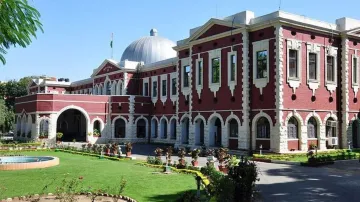Ranchi: The Jharkhand High Court on Tuesday directed the state government to identify illegal Bangladeshi immigrants in the Santhal Parganas region. A division bench, led by Acting Chief Justice Sujit Narayan Prasad and Justice Arun Kumar Rai, issued the order in response to a public interest litigation on illegal immigration.
This comes amid unrest in Bangladesh and several people are fleeing to India. However, attempts by those have been thwarted by the Border Security Force (BSF) personnel on the India-Bangladesh border.
Bangladesh, currently facing a significant crisis, has recently experienced widespread violence, with numerous Hindu temples, homes, and businesses being vandalised. The 'unstable situation' was created by weeks of deadly protests that resulted in former Prime Minister Sheikh Hasina's ouster and the formation of an interim government last week. Hasina's ouster was marked by rampant violence across various parts.
Jharkhand HC directs to launch campaign to find out original residents
The court directed the government to launch a campaign to determine the original residents of the area. It also ordered that documents for ration cards, Aadhaar cards, and voter IDs be issued only after verifying the land documents and domicile status of applicants.
The bench said that illegal immigration from the neighboring country was a dangerous proposition and a matter of serious concern for the state and the Centre.
Petitioner Daniel Danish informed the court that illegal immigrants have settled in six districts of Santhal Parganas—Deoghar, Dumka, Sahibganj, Pakur, Godda, and Jamtara—causing significant demographic changes. The tribal population has decreased from 44.67 per cent to 28.11 per cent between 1951 and 2011, while the minority community's share has risen from 9.44 per cent to 22.73 per cent.
The court will hear the matter again on August 22.
Bangladesh protests
The student-led movement that ousted Hasina grew out of protests against quotas in government jobs that spiralled in July, provoking a violent crackdown that drew global criticism, though the government denied using excessive force. The protests were fuelled also by harsh economic conditions and political repression. The COVID-19 pandemic damaged the $450 billion economy after years of strong growth, leading to high inflation, unemployment and shrinking reserves. It pushed the Hasina government to seek a $4.7 billion loan from the International Monetary Fund.
(With PTI inputs)
Also Read: Jharkhand: Nursery class student raped by school van driver
Also Read: Jharkhand: Over 24 IAS officials transferred in major bureaucratic reshuffle | List
